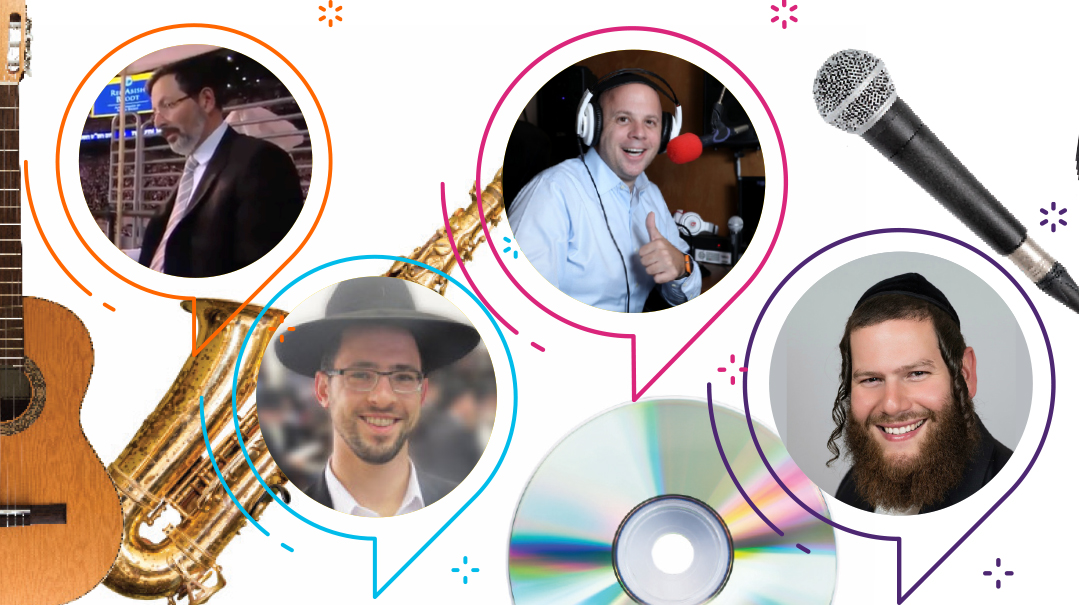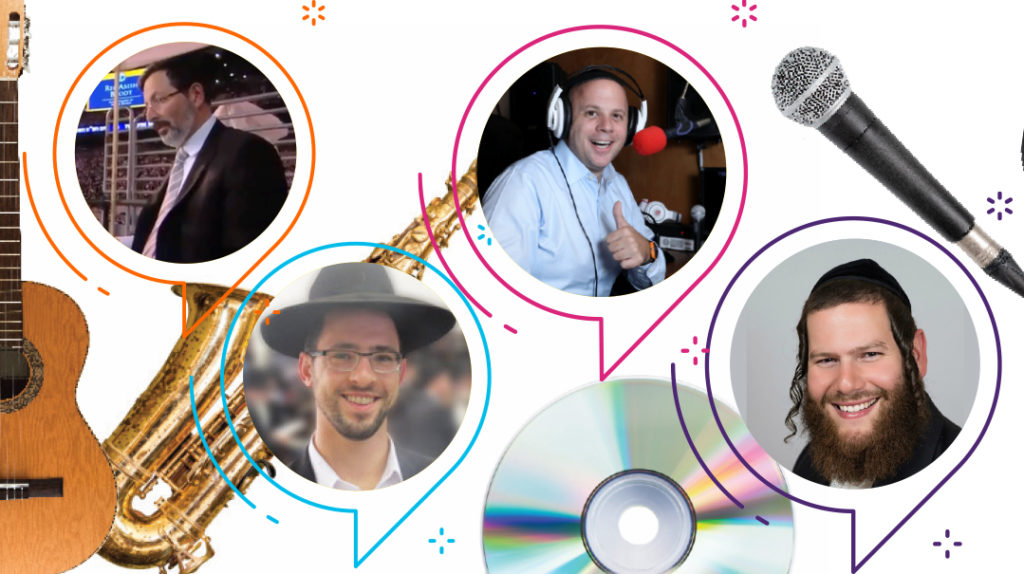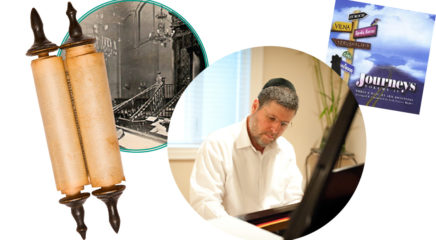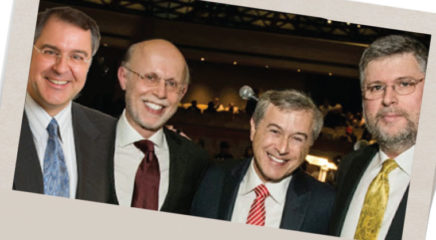We’ve asked four long-time music experts to share their memories, musings, and the songs that were most special

I
t’s been a year since COVID hit, and who last year would have imagined that this Purim, there would be no tishen, no mesibahs, no grand events to mark this holiest and joyous of days? But there’s one thing no rules or regulations can stop, and that’s the music. We’ve asked four long-time music experts to share their memories, musings, and the songs that were most special. But you don’t have to be a music maven to make sure that, no matter where you are this Purim, the music doesn’t stop — because that’s the deepest way for the soul to rejoice.
OUR PANEL
SHABSI PARNES A legendary one-man-band, Shabsi has been bringing joy to Jewish simchahs and events for the past 42 years.
MENACHEM TOKER A popular longtime DJ on Israel’s Radio Kol Chai, Menachem has been in the forefront of the music scene for 25 years, and with his wide-ranging influence, many artists owe him their start.
RABBI DAVID LAVON Rabbi Lavon, master of the parody video (just in time for Purim), has been producing Jewish music videos for the past 18 years.
YANKY ORLANSKY Yanky is owner and director of the Yedidim choir, a versatile group who, under his direction, has for over a decade been tailoring its sound to all types of venues all over the world.
If you make a special request from the band at a family simchah, what do you usually ask for?
Shabsi: I’m in the business 42 years, so I can tell you that the band doesn’t usually need requests. If they’re professionals, they can look at the families, look at the crowd, and they know what to play. But maybe I would say, “I want a Jewish wedding, please play music that sounds Jewish.” I once went to the wedding of a friend’s child, and from right after the chuppah until the chassan and kallah walked in, the band didn’t play one Jewish song. I went over and asked the band leader, “Did the families request this kind of music?”
“No,” he replied.
“So why are you playing it?”
“‘Why not? We feel like it, and nobody knows the difference.”
“But YOU know the difference,” I said. “Don’t you have enough Jewish music to choose from?”
“You’re right,” he said, and they switched styles.
Yanky: I’d tell them to make sure to have fun on stage and enjoy the simchah.
David: “Please turn the speakers down.” At risk of sounding like an old man, there is absolutely no reason for them to be as loud as they usually are. Besides the fact that my mother thinks she lost some of her hearing due to exposure to these high decibels, one can almost feel how damaging such an unnecessary level of sound is to the ears. Loud? Geshmak. Blazing? Long term suffering. Katan haroeh es hanolad.
Can you name an unlikely hit, a song you never thought would make it but it did?
Menachem: Sure. I would say all of Ishay Ribo’s material. That was my biggest mistake ever — Ishay asked me for a radio interview after the release of his first song, he actually ran after me, and I didn’t think his music was going anywhere, so I pushed him off, saying that my program was full and I had no time. And look where Ishay and his music are now. That is the biggest faschla of my career — now you know!
Yanky: “Ya’amoid,” the single released by my brother-in-law, Shea Berko.
Shabsi: I was in yeshivah and camp with Sheya Mendlowitz. Right after I got married, Sheya came over and we were talking music. He said, “I have a little song, tell me if it sounds like anything,” and he started to sing a tune. The first part, I thought, was nothing much. The second was just a harmony of the first part, it could be sung alongside it, and the third part was nothing major. All in all, I thought, let’s go on to the next thing. Sheya ended up selling his song to Yermiya Damen from Belz, and it was one of the new niggunim sung at the chasunah of the Rebbe’s son: “Siman tov umazel tov umazel tov vesiman tov ye-hei lanu ul’chol Yisrael… a ya ya ya ya ya ya ya ya a a a a ya ya ya ya ya yay …” The next I heard of it was when I was playing at the chasunah of a big Belz philanthropist in Williamsburg, and he asked me to play the new songs that had been sung at the Rebbe’s chasunah two week’s before. He gave me the score of “Siman Tov Umazel Tov” and “Tehei Hashu Hazois.” I played it and it sounded so familiar — it was Sheya’s little tune. I cannot believe how far that song went. Go figure! You can hear it at every wedding. I guess each song has its mazel.
What is your earliest song-related memory?
Shabsi: I started out playing the accordion as a kid, and the first song I learned to play was the tune of “Hashem is Here, Hashem is There,” although it had not yet acquired those words at the time.
David: The classic “Acheinu Kol Beis Yisrael.” Every time there was the slightest opportunity for an emotional experience, this song was there.
Yanky: Listening to the Camp Shalva tapes, the songs of Reb Moshe Goldman a”h. We’re Bobover chassidim, so his tapes were the natural choice in our home. The earliest album I remember was Al Har Govoha.
Menachem: When I was a small kid, there was no frum radio station in Israel, but I never missed listening to the weekly Jewish music program on Kol Yisrael. They had this big Top Ten competition, called “Ad Hazemer,” which was super exciting. I remember that one day I came late to cheder, and when the rebbi asked why, I told him that I’d gone to sleep really late because of the song contest. So, of course, he kicked me out and sent me back home.
Is there something special you listened to in the car today?
Menachem: I use my car time for phone calls today.
Yanky: The song list for tonight’s event, to make sure I have it absolutely perfectly ready.
David: A vaad on chesed from the sefer Alei Shur, given by my rebbi, Rav Avigdor Brazil. The Torah sings the most beautiful songs! Ari Goldwag’s newest album, Yesh Li Hakol, has been in my car’s CD player since it came out this past summer, though. Specifically, the song “Ashira” has been on repeat.
Shabsi: Everything and anything is on my playlist, including a lot of classical music.
If you had a choice, which singer would you invite to your Purim seudah?
David: No one. A Purim seudah done right wouldn’t allow me the focus to enjoy any specific singer. I would try to just “be,” without care of my surroundings. For an oneg on Shabbos though, I would love to have Motty Steinmetz, among some others.
Yanky: The list of singers I’d love to have with me on Purim is too long for this space, and we’d need a few days of Purim to accommodate them all.
Menachem: A mixture of Lipa, Shmueli Ungar, and Matt Dubb. Can you find me someone who has all those three talent sets rolled into one?
Shabsi: I can’t really answer that, as I’m friends with everyone and I have utmost respect for all the singers for the hard work they do to bring simchah to people — it’s not as easy as it looks. When I make a wedding, I always ask the mechutan to take care of arranging the music, because I really can’t choose! But I’ll tell you about one combination of singers I’ve never forgotten. Not long after my marriage, I used to travel to play concerts. We had a big concert in Miami Beach, and because it was a Thursday night, we stayed at the Crown Hotel over Shabbos. My wife and I were seated at the table with MBD, Shlomo Carlebach, and Jo Amar, and I can tell you that the singing at those seudahs was incredible. They sang on for hours, and the entire hotel came to sit around and listen. So when Mashiach comes, if I could invite those three to my Purim seudah, I guess it would be nice.
Is there a song you consider only for the musical connoisseur?
Menachem: I think any song composed by Boruch Sholom Blesofsky belongs in this category. He’s not so big commercially as a composer, because his songs are not for everyone, but in my opinion, he is a musical genius, a gaon.
David: “Lecha Hashem,” sung by the Chevra on Chevra 2.
Yanky: I guess it all depends on who the connoisseur is! One thing I’ve learned in this business is that every person has their own taste in music, and every song speaks to different people. As singers, we make sure to work with the client to identify those songs and perform them.
Shabsi: Classical music, today. Most people do not understand it.
Is there a song that you absolutely never get bored of?
Menachem: Any MBD song.
Yanky: The traditional Od Yishoma that we sing every night, watching the excitement swell as chassan and kallah come into the ballroom.
What is your favorite tune for “Ani Maamin”?
Yanky: Moshe Goldman’s slow and powerful version. It’s what I grew up with.
Shabsi: The highlight of my career has been playing for the Siyumei HaShas. The first one I played for was 1985, where there were only around 5,000 participants, in the Felt Forum at Madison Square Garden. We only played two things: “Keil Malei Rachamim”, which Chazzan Dovid Werdyger sang, and the “Ani Maamin” composed by Reb Azriel Fastag in the cattle car on the way to Treblinka. Many in the audience then had been through the horrors of the war, and the song brought out all their emotions. I’ve played “Ani Maamin” at every Siyum HaShas since then, and it remains very meaningful to me.
David: The Label Sharfman/Abie Rotenberg one from Dveykus 4 — “Ahhhni Maaaamin beeeemunah sheeelaaaymaaah sheha Borei Yisborach Shemo…”
Menachem: I used to work on Arutz Sheva radio, and every night they used to close the program with MBD’s “Ani Maamin” from the Let my People Go album, so that became my favorite. Please, all composers reading this — don’t compose any more tunes for Ani Maamin. It’s enough already, we’re swamped!
What niggun did they play as you walked to the chuppah?
Shabsi: Reb Bentzion Shenker’s “VeliYerushalayim Ircha Berachamim Tashuv” I wanted something to remind us of the Beis Hamikdash.
Menachem: As I walked down to the chuppah, my grandfather, then aged 100, sang a duet together with MBD. It was very moving for me.
Yanky: The Chabad “Daled Bavos” niggun, written by the Alter Rebbe. It is incredibly hartzig and warm, and as known in Chabad, you’re only allowed to sing this niggun on special occasions, one of which is at a chuppah.
David: A Yom Kippur tune, because one’s chasunah is compared to Yom Kippur and I felt it would help get in the right mood and mindset. Besides my own feelings, a couple of my friends were brought to tears. I think that was a sign that I made a good choice.
Is there a chassidish song every Litvak should know?
Menachem: Look, the Litvaks know how to learn — baruch Hashem they are very good at learning — but they don’t know how to sing (I’m speaking as the son of a Litvak). It took a very long time until we even had a Litvish singer. I know Carlebach started out Litvish, but that didn’t last long.
Shabsi: The Baal HaTanya’s niggun.
Yanky: I would say the classic Karliner “Kah Echsof.” We always sang Kah Echsof at Shabbos events in the chassidish crowd, but three or four years ago, we started getting asked to sing it at Litvish events too. Now, it’s a staple in every community — there is just no Friday night without Kah Echsof. It can even be sung twice, at the seudah and at the oneg.
Is there a particular song that reminds you of a major life event?
Menachem: Shwekey’s “Racheim” reminds me of the Twin Towers. When the song came out on his debut album, Shomati, no one in Israel had really heard of him, so he flew me into America to talk. This was two months before September 11, 2001, and we spoke about “Racheim” and filmed a video clip against the Manhattan skyline. A short while later, when I heard about the attack, “Racheim” was running through my mind. There were many terrible terror attacks in Israel too at the time, and each time, I played “Racheim” on the radio. Every time I hear it, those days come flooding back to me.
David: I make videos as a side hobby and parnassah, and these past few summers we’ve made a summer vacation video to show hakaras hatov to our family who flew us in to America for such a nice vacation. The songs we’ve used for those videos will always remind me of those summers. Among them are Dovid Lowy’s “Ta’amin Sheyihiyeh Tov” and “Colorful,” and Mordechai Shapiro’s “Tov Hashem.”
Is there a song that people either love or hate — and that you love?
David: The French song by Ishay Ribo and Amir Haddad, “Comme les Oiseaux (Like the Birds).” I bet people think, “Whoa, this song is in a language other than Brooklyn, it must not be for me.” Anyone who listens to it, though, is hooked.
Menachem: I think that applies to all the modern songs with electronic music and a strong beat that I play on the radio. Some people (aged 60-plus) hate them, and other people (aged 60-minus) love them.
Who, in your opinion, is the best lyricist in the world of Jewish music?
Yanky: For Yiddish, it’s Motti Ilowitz. I’ve worked with him a lot on a personal level, and his talent is an outstanding gift from Hashem. For English lyrics, I would say Abie Rotenberg, where every word is a meaning on its own.
Menachem: Dovid Hamelech, of course. I also have to say that Ishay Ribo is a genius.
David: The yetzer hara, because he always gets us to think of the best lines — both in and out of the Jewish music world. And as far as my education tells me, could be answering this question would be lashon hara — I wouldn’t want other lyricists to feel bad. But seriously, I’d love to see a collaboration with Miriam Israeli, 8th Day, Nissim Black, and Abie Rottenberg, who are among some of the most fantastic lyricists out there.
Shabsi: I’m not always aware of who writes the lyrics to the songs, but it’s hard to compete with Mrs. Dina Storch’s beautiful “Someday.”
What do you consider the most uplifting tune for Kedushah?
Yanky: As I walk into the shul, I look around at the crowd and get a feel for which kind of niggun will be best-received. For some crowds, what is known as the “harder Carlebach Mimkomcha” (although it’s actually a niggun of prewar composer Reb Berel Vishover) works nicely. There’s also Eitan Katz’s “Lemaancha” or Moshe Goldman’s “Ani Maamin.” I sometimes pick the Belz song “Av Harachamim.” In a real chassidish crowd, I sing the last part of the niggun of Yossele Rosenblatt’s “Hamavdil.”
Menachem: I’m assuming you mean Mussaf, because I tend to come late for Shacharis. I would say the Chabad niggun for “Hu Elokeinu” is always a beautiful choice.
David: Mimkomcha, the long Carlebach one, done slowly.
Shabsi: “Kah Echsof.” It’s a truly elevated tune. It also has a very special place in my own heart because my father, who loved to sing but lost his ability to do so when he endured a stroke, sang Kah Echsof in its entirety on the Friday night that he passed away. He had not sung for years, but he left This World with that niggun.
Which song is great for unlocking hearts?
Yanky: The classic Selichos song “Machnisei Rachamim,” composed by Reb Chaim Banet. Whenever it’s sung, you can see on the faces of the crowd, whether chassidish or Litvish or anything in between, that every person relates to it.
Shabsi: The classis “Ani Maamin” from Pirchei of the late ‘60s, written by Mutty Parnes and Itzy Weisberg, is always on target. Another one of my favorites is MBD’s rendition of “The Little Bird is Calling,” “Someday,” and “Achakeh Lo,” a combination we used to do at concerts together, which he then put onto his Around the Year album.
David: “The Man from Vilna,” by Abie Rotenberg, where the men danced around in circles in the ruins of the shul, holding a surviving Jewish child in place of a Sefer Torah.
The golden oldie that every kid today should know
Menachem: The jingle that opens my radio show.
David: “Joe Dimmagio’s Card.”
Yanky: I would say Shmuel Kunda’s CDs.
Shabsi: I could choose a hundred songs, but who says the kids today would want to know what I think they should know? That said, the old-time niggunim were real songs — if you listen to The London School of Jewish Song or Bentzion Shenker’s albums, each song is a masterpiece. Some continue to be played every night, like his “Yosis,” because they are classics, and others have recently been revived for a new generation, like the JEP songs on Baruch Levine’s new album, plus all the nostalgic segments in today’s concerts. But in the end, music is music, and all Jewish music is good — the main thing is to be mesameiach Yidden, that people should be happy.
(Originally featured in Mishpacha, Issue 850)





